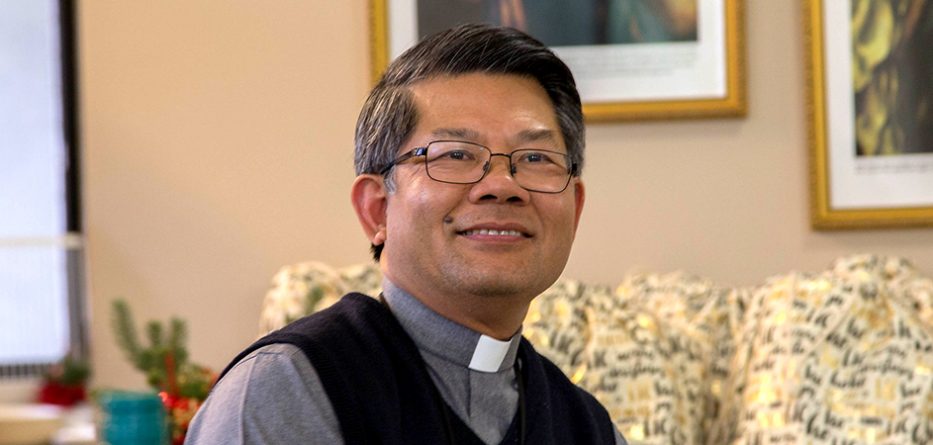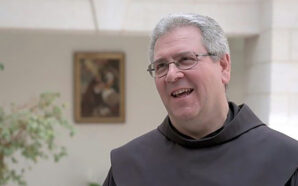Most Reverend Vincent Long Van Nguyen OFM Conv DD STL,┬ĀBishop of Parramatta
Address at the Social Justice Statement Launch 2019
ŌĆ£The Solidarity of the Good Samaritan in the Digital WorldŌĆ£
Sydney, 3 September 2019
Good morning everyone. I too acknowledge the Cammeraygal people. Let us join in paying respects to the traditional owners and giving thanks for their care and stewardship for this land.
Whether we have a particular interest in technology or not, none of us can ignore the fact that the world has changed enormously since the invention of the internet. Pope Francis asks us to ŌĆ£boldly become citizens of the digital worldŌĆØ and his use of social media continues the tradition of the Church embracing new forms of communication.
This is not surprising because communication is essential to the mission of announcing GodŌĆÖs reign of justice and peace.
Yet digital platforms are not only a means of announcing the reign of God; they are also ŌĆśplacesŌĆÖ that need to be transformed to reflect the in-breaking of GodŌĆÖs reign. They are places where we can communicate like never before, and places that can subtly shape the way in which we communicate. The big questions then are moral rather than technical.
What does it mean to be the People of God, here and now, face-to-face and online?
The Social Justice Statement takes as its interpretive key the Parable of the Good Samaritan. The Samaritan is moved with compassion to help another in need. Furthermore, the Samaritan crosses entrenched divisions based on culture, race, religious belief and practice to recognise and uphold the dignity of the person who has been robbed and assaulted.
It is not a story of ŌĆ£vague compassionŌĆØ as John Paul II put it but of real solidarity.[1]┬ĀPope Francis has also made solidarity one of his constant themes, even though he notes that some people, even in the church, see it as ŌĆ£a dirty wordŌĆØ.[2]
What might solidarity mean in the digital world?
Catholic Social Teaching scholars have articulated three forms or expressions of solidarity; incarnational solidarity, institutional solidarity and conflictual solidarity.
Sometimes our ŌĆ£solidarityŌĆØ can be disembodied, distant or merely conceptual. The critique of ŌĆ£clicktivismŌĆØ comes readily to mind. Digital platforms have been a godsend for social justice movements, but all the awareness raising, mobilising and advocacy that takes place online also has to land somewhere in real life; we have to make it real.
Kristin Heyer, a professor at Boston College, says that incarnational solidarity requires us to ŌĆ£immerse our bodies and expend our precious energy in practices of concrete accompaniment in the real world.ŌĆØ[3]
The┬ĀTen Steps Towards Making it Real┬Āaction leaflet provides good suggestions on how each one of us can incarnate our solidarity ŌĆō to give it flesh and bones ŌĆō both online and face-to-face.
Solidarity however requires more than individual action alone; it requires an institutional response. Institutional solidarity calls for structures that offer marginalised persons a genuine voice in decisions and policies that affect their lives so that our interdependence is marked not by relationships of domination and oppression, but by relationships of equality and mutuality.
In the digital world we need empowered participation in decision-making for the full range of affected stakeholders; we cannot simply leave matters to the tech companies. We need structures of accountability and transparency to govern the digital world for the good of all.
The Statement encourages institutional solidarity through its advocacy of the regulation of data gathering by platforms, and international cooperation for the governance of the internet. It also points out the responsibility of governments to ensure that everyone can effectively access essential services.
When we work for the justice of GodŌĆÖs reign, we will be confronted by issues of economic and political power. Although the Church always works for peace and unity among the human family, we sometimes need to take sides and stand with those who are the poorest, the most pushed aside and excluded, those whose dignity and rights have been abused. We call it making an option for the poor.
If the internet represents an extraordinary possibility of access to knowledge, it is also true that it has proven to be one of the areas most exposed to disinformation and to the distortion of facts and interpersonal relationships, which are often used to discredit. St Paul speaks of the duty that arises out of our being in a relationship of communion: ŌĆ£Therefore, putting away falsehood, speak the truth, each to his neighbour, for we are members one of anotherŌĆØ (Eph 4:25).
In a digital world where fake news, divisive, offensive and misogynistic content are not uncommon, we may even need to exercise conflictual solidarity. We cannot be bystanders in the face of cyberbullying, trolling and the objectification of others. Each one of us can call out bad behaviour and stand by victims.
As a faith community we can also be more prophetic in standing up for minorities and vulnerable groups who are subjected to vilification, hate speech and threats of violence online. Being the People of God calls us beyond seeking measures for the protection only of our own rights. We are summoned to build a world where GodŌĆÖs vision of peace and harmony for all his creatures, great and small, is enacted.
We are the┬Āpilgrim┬ĀPeople of God, and we are entering new territory on the journey. I hope that this yearŌĆÖs Social Justice Statement will help us to discern which paths to take.
It is an honour to join with Beth Doherty and Margaret Van Heekeren as we hereby launch the 2019 Statement ŌĆō┬ĀMaking it Real: Genuine human encounter in our digital world.
Most Rev Vincent Long Van Nguyen┬ĀOFM Conv
Bishop of Parramatta
Chair of the Bishops Commission for Social Justice: Service and Mission
[1]┬ĀJohn Paul II,┬ĀSollicitudo rei Socialis, n 42.
[2]┬ĀFrancis,┬ĀAddress at Visit to the Jesuit Refugee Service Centro Astalli, 10 September 2013, Rome. http://w2.vatican.va/content/francesco/en/speeches/2013/september/documents/papa-francesco_20130910_centro-astalli.html
[3]┬ĀKristin E Heyer. ŌĆØRadical Solidarity: Migration as Challenge for Contemporary Christian EthicsŌĆØ┬ĀJournal of Catholic Social Thought, Vol 14 No 1, 2017, p 7.








